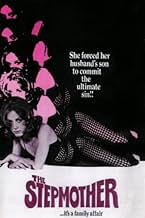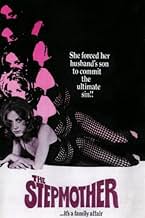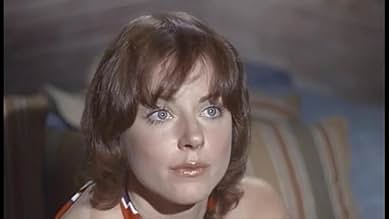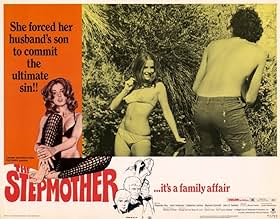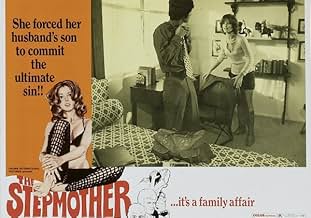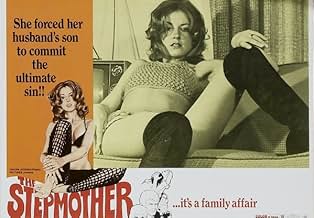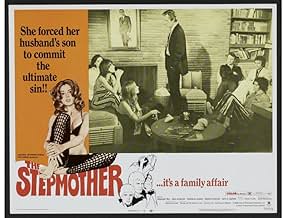As part of a blackmail plot, a woman is forced to seduce her new husband's son. Complications, including murder, ensue.As part of a blackmail plot, a woman is forced to seduce her new husband's son. Complications, including murder, ensue.As part of a blackmail plot, a woman is forced to seduce her new husband's son. Complications, including murder, ensue.
- Nominated for 1 Oscar
- 1 nomination total
Katherine Justice
- Margo Delgado
- (as Catherine Justice)
Margaret Garcia
- Lupé
- (as Margarite Garcia)
Gil Barreto
- José
- (as Gilberto Berreto)
Bert Madrid
- Mexican Businessman
- (as Burt Madrid)
David Garfield
- Goof
- (as John D. Garfield)
- Director
- Writer
- All cast & crew
- Production, box office & more at IMDbPro
Featured reviews
Ban, a sacred prohibition by which certain people or objects are considered untouchable, certain actions unperformable, certain words unspeakable. The sinful relationship between the stepmother and her stepson is the film's breaking point, revealing the dark side of desire and sexual repression. The marriage founders because of this betrayal and the lies used to hide it. The violence stems from domestic evil, not from external enemies, but from within the home. The protagonist is violent and kills in the grip of jealousy, unleashing a spiral of guilt, cover-ups, and lies. He doesn't even seek redemption, driven only by insane jealousy. The female figure is not only a seductress, but also an element of fragility, using sensuality as a mask for her existential unease.
Real estate developer Frank Delgado (Alejandro Rey), returning home from a business trip, finds a friend at home who confesses to having sex with his wife, Margo (Katherine Justice). Enraged by jealousy, Frank kills him. From that night onward, his partner Dick Hill (Larry Linville) begins to suspect something is afoot, but in an accident, he falls from a building during an argument with Frank and dies. Dick's wife, Sonya Hill (Marlene Schmidt), becomes his new partner, raising Inspector Darnezi's (John Anderson) suspicions of an affair between her and Frank.
Director Howard Avedis (4.0) attempts to craft a Hitchcockian thriller, but his success is limited, partly due to the modest means available; the screenplay (5.0) by the director himself alternates between a slow pace and sudden accelerations, with some "disjointed" or redundant sequences and an excessive use of freeze-frame; from a technical standpoint (5.0), Robert Steadman's cinematography stands out, despite its technical limitations, it manages to create a sufficiently realistic atmosphere; Audrey Granville's soundtrack is melodramatic, contrasting too much with the delicate song "Strange Are the Ways of Love" by Sammy Fain and Paul Francis Webster (nominated); the cast (4.0) is very disappointing, out of character, stiff, and unbelievable, with the only exceptions being the two female leads, Justice and Schmidt.
Best moment: Probably the beginning, where the film presents itself for what it is: poor acting, a morbid plot, technically modest, but with a beautiful song that proves that even in a pigsty, a beautiful flower can grow. Worth watching when you have nothing better to do, or you want to fall asleep listening to a voice that keeps you company.
Real estate developer Frank Delgado (Alejandro Rey), returning home from a business trip, finds a friend at home who confesses to having sex with his wife, Margo (Katherine Justice). Enraged by jealousy, Frank kills him. From that night onward, his partner Dick Hill (Larry Linville) begins to suspect something is afoot, but in an accident, he falls from a building during an argument with Frank and dies. Dick's wife, Sonya Hill (Marlene Schmidt), becomes his new partner, raising Inspector Darnezi's (John Anderson) suspicions of an affair between her and Frank.
Director Howard Avedis (4.0) attempts to craft a Hitchcockian thriller, but his success is limited, partly due to the modest means available; the screenplay (5.0) by the director himself alternates between a slow pace and sudden accelerations, with some "disjointed" or redundant sequences and an excessive use of freeze-frame; from a technical standpoint (5.0), Robert Steadman's cinematography stands out, despite its technical limitations, it manages to create a sufficiently realistic atmosphere; Audrey Granville's soundtrack is melodramatic, contrasting too much with the delicate song "Strange Are the Ways of Love" by Sammy Fain and Paul Francis Webster (nominated); the cast (4.0) is very disappointing, out of character, stiff, and unbelievable, with the only exceptions being the two female leads, Justice and Schmidt.
Best moment: Probably the beginning, where the film presents itself for what it is: poor acting, a morbid plot, technically modest, but with a beautiful song that proves that even in a pigsty, a beautiful flower can grow. Worth watching when you have nothing better to do, or you want to fall asleep listening to a voice that keeps you company.
Upon returning home from a business trip "Frank Delgado" (Alejandro Rey) finds another car in his driveway and happens to see his wife, "Margo Delgado" (Catherine Justice) in their bedroom with another man. As the man comes out into the front yard Frank kills him in a fit of rage. Immediately afterward he comes to his senses and decides to quickly bury him in a field on the outskirts of town. Unfortunately, as luck would have it the body is soon discovered anyway and Frank is considered as a possible suspect. In the meantime though, Frank cannot manage to forgive his wife because of her supposed infidelity and so refrains from making love to her from then on. What he doesn't know is that the man he killed had forced himself on her and since Margo is unaware that Frank knows anything about this incident it has left her feeling confused and sexually frustrated. Now, rather than reveal any more of the film I will just say that this was an adequate movie for the most part. The acting was okay but the story seemed to lag here and there. Likewise, I also thought the ending was a bit too abrupt. All things considered then, I rate the movie as slightly below average.
I like weird 70's movies a lot, but this is weird even by weird 70's standards. It takes about half the movie, for instance, to even figure out why it's CALLED "The Stepmother"--it, at first, seems to be a movie about a jealous middle-aged, Mexican-American architect who murders a business associate after he finds him in bed with his younger gringa wife (and unbeknownst to the wife). By a weird coincidence another more lower-class Mexican also murders his wife in the same area and is framed for both murders. But the cops begins to suspect the architect, and his continuing jealously causes him to accidentally kill his partner and best friend (played by "MASH's" Larry Linville). He then has to fend off the amorous advances of the friend's widow before the cops grow even more suspicious. Got all that so far?
So why is it called "The Stepmother"? Well, about halfway through the man's son shows up from Mexico City, and he also starts messing around with the young wife (his stepmother)and the off-kilter plot REALLY goes into over-drive.
There are a few reasons to see this. First, if you're a weird 70's film completist. This film is kind similar to early 70's bizarro flick "Swinger's Massacre", which was equally ridiculous but had a less random plot. Second, if you're a fan of Larry Linville, he's actually pretty good here and acts circles around the rest of the unknown cast. The best reason perhaps though is this was the first appearance of cult drive-in queen Claudia Jennings. Jennings has a cameo role as a stoned-out hippie chick who has one hilarious line where she tell the cops she was "way too ripped" to remember what happened the night of the murder. (And if that isn't worth the price of admission, she also has her typically gratuitous full-frontal nude scene). Weird, weird movie, but if any of this sounds interesting to you, check it out.
So why is it called "The Stepmother"? Well, about halfway through the man's son shows up from Mexico City, and he also starts messing around with the young wife (his stepmother)and the off-kilter plot REALLY goes into over-drive.
There are a few reasons to see this. First, if you're a weird 70's film completist. This film is kind similar to early 70's bizarro flick "Swinger's Massacre", which was equally ridiculous but had a less random plot. Second, if you're a fan of Larry Linville, he's actually pretty good here and acts circles around the rest of the unknown cast. The best reason perhaps though is this was the first appearance of cult drive-in queen Claudia Jennings. Jennings has a cameo role as a stoned-out hippie chick who has one hilarious line where she tell the cops she was "way too ripped" to remember what happened the night of the murder. (And if that isn't worth the price of admission, she also has her typically gratuitous full-frontal nude scene). Weird, weird movie, but if any of this sounds interesting to you, check it out.
A hot-headed architect thinks his wife is cheating on him, which leads him to murder. Another, even worse guy gets the blame but the police still have suspicions. Meanwhile, the stress of all this palaver drives his wife to seduce his son.
This drive-in flick was made by exploitation specialists Crown International in the period when they were producing their most consistently interesting work. While this isn't amongst their best as such, it's still effective enough and gets by quite a bit off the back of its early 70's charms. It has to be said that it indeed does take a long while before the title of the movie attains any relevance whatsoever but that's just one of the factors that gives this one its goofy appeal I reckon. So long as you don't go into this one with unrealistic expectations, then I think a pretty good time can be had. Its simple-minded melodrama kept me entertained in any case. On a final note, and what has to be the one thing that will always make this one at least a footnote in cinema history is the quite unbelievable fact that the crooning song with Latin beat that plays over the credits entitled 'Strange Are the Ways of Love' was actually nominated for an Academy Award! There is no way on Earth I ever expected anything from Crown International got anywhere near Oscar territory. The early 70's truly were strange days indeed
This drive-in flick was made by exploitation specialists Crown International in the period when they were producing their most consistently interesting work. While this isn't amongst their best as such, it's still effective enough and gets by quite a bit off the back of its early 70's charms. It has to be said that it indeed does take a long while before the title of the movie attains any relevance whatsoever but that's just one of the factors that gives this one its goofy appeal I reckon. So long as you don't go into this one with unrealistic expectations, then I think a pretty good time can be had. Its simple-minded melodrama kept me entertained in any case. On a final note, and what has to be the one thing that will always make this one at least a footnote in cinema history is the quite unbelievable fact that the crooning song with Latin beat that plays over the credits entitled 'Strange Are the Ways of Love' was actually nominated for an Academy Award! There is no way on Earth I ever expected anything from Crown International got anywhere near Oscar territory. The early 70's truly were strange days indeed
In THE STEPMOTHER, Frank (Alejandro Rey) catches his wife Margo (Katherine Justice) having sex with another man, leading to Frank's putting an end to loverboy. After disposing of the body, Frank scowls and frowns a lot while the police investigate.
Meanwhile, a carload of hipsters arrive, led by Dick (Larry Linville!). Frank continues his grimacing amidst the frolicking hepcats.
Uh oh!
Frank sees Margo and Dick together! Luckily, it's all just a misunderstanding. Unluckily, Frank is too jealous and enraged to care. Sorry, Dick! Hmmm, why is Frank taking you to the roof of a tall building?
Eeeeaagh!
THE STEPMOTHER is another drive-in ready movie from Crown International Pictures. It's perfect for its time, complete with senseless violence, ample female nudity, 1970's ambiance, and serious groov-i-tude. In addition, how could anyone not like a movie with a character called "The Goof" in it?
How, indeed...
Meanwhile, a carload of hipsters arrive, led by Dick (Larry Linville!). Frank continues his grimacing amidst the frolicking hepcats.
Uh oh!
Frank sees Margo and Dick together! Luckily, it's all just a misunderstanding. Unluckily, Frank is too jealous and enraged to care. Sorry, Dick! Hmmm, why is Frank taking you to the roof of a tall building?
Eeeeaagh!
THE STEPMOTHER is another drive-in ready movie from Crown International Pictures. It's perfect for its time, complete with senseless violence, ample female nudity, 1970's ambiance, and serious groov-i-tude. In addition, how could anyone not like a movie with a character called "The Goof" in it?
How, indeed...
Did you know
- TriviaThe Oscar nomination for "Strange Are The Ways Of Love" for Best Song marked the only time a Crown International Picture title got an Oscar nomination. It lost to "The Morning After" from The Poseidon Adventure (1972).
- Quotes
Sonya Hill: My life's empty without Dick.
- ConnectionsFeatured in Dusk to Dawn Drive-in Trash-o-Rama Show Vol. 8 (2002)
- SoundtracksStrange Are The Ways Of Love
(theme song)
Music by Sammy Fain
Lyrics by Paul Francis Webster
Arranged by Robert Matthews
Vocal by Manuel
- How long is The Stepmother?Powered by Alexa
Details
- Release date
- Country of origin
- Official site
- Language
- Also known as
- Impulsion
- Filming locations
- Los Angeles, California, USA(Filiming City)
- Production company
- See more company credits at IMDbPro
Contribute to this page
Suggest an edit or add missing content


